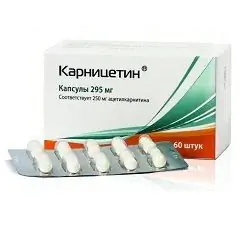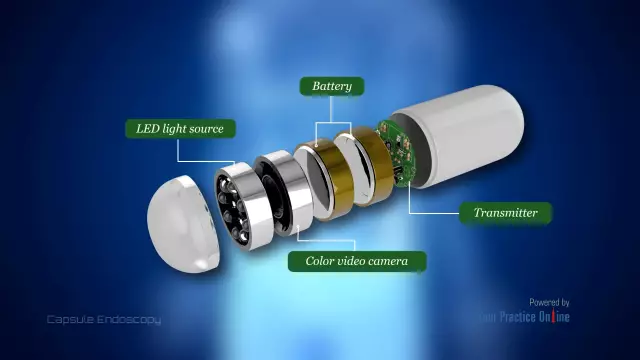- Author Rachel Wainwright wainwright@abchealthonline.com.
- Public 2023-12-15 07:39.
- Last modified 2025-11-02 20:14.
Karnitsetin
Karnitsetin: instructions for use and reviews
- 1. Release form and composition
- 2. Pharmacological properties
- 3. Indications for use
- 4. Contraindications
- 5. Method of application and dosage
- 6. Side effects
- 7. Overdose
- 8. Special instructions
- 9. Application during pregnancy and lactation
- 10. Use in childhood
- 11. Drug interactions
- 12. Analogs
- 13. Terms and conditions of storage
- 14. Terms of dispensing from pharmacies
- 15. Reviews
- 16. Price in pharmacies
Latin name: Carnicetine
ATX code: N06BX12
Active ingredient: acetylcarnitine (acetylcarnitine)
Manufacturer: PIK-PHARMA PRO LLC (Russia), PIK-PHARMA LEK LLC (Russia)
Description and photo update: 2018-21-11
Prices in pharmacies: from 476 rubles.
Buy

Carnitsetin is an agent that improves metabolism and energy supply to brain tissues.
Release form and composition
Dosage form Karnitetin - capsules: white, gelatinous, solid, size No. 0, with the contents in the form of a powder, white or white with a yellowish tinge, with a slight characteristic smell of acetic acid (in a blister contour package 10 pcs., In a cardboard box 6 packs; in a blister contour package 15 pcs., in a cardboard box 4 packages; in a can made of polymer material 60 pcs., in a cardboard box 1 can).
Composition of one capsule:
- active substance: acetylcarnitine - 250 mg (in the form of acetylcarnitine hydrochloride - 295 mg);
- auxiliary components (content): microcrystalline cellulose, aerosil A-300 (colloidal silicon dioxide), magnesium stearate;
- capsule shell: glycerin (glycerol), gelatin, methyl parahydroxybenzoate (nipagin), propyl parahydroxybenzoate (nipazole), sodium lauryl sulfate, titanium dioxide, purified water.
Pharmacological properties
Pharmacodynamics
Acetylcarnitine is a natural biologically active substance that is present under physiological conditions in many organs and tissues, including the central nervous system. It takes part in the metabolism of carbohydrates and fatty acids. Acetylcarnitine is a biologically active form of a substance that plays a key role in the dissimilation of fats and the formation of energy in the body - L-carnitine. The metabolic effects of L-carnitine and the acetyl group largely determine the biological and pharmacological action of Carnicetin.
The synthesis of acetylcarnitine occurs in the brain tissue, kidneys and liver from L-carnitine under the action of the enzyme carnitine acetyltransferase. The active substance is an easily available substrate for starting energy-dependent metabolic processes in mitochondria, since it delivers activated acetate for the synthesis of acetyl-coenzyme A, which is involved in the citrate cycle, directly into the mitochondrial matrix without additional energy expenditure. Acetylcarnitine promotes the stimulation of the synthesis of phospholipids and proteins in the construction of membranes, and improves the regeneration processes. Due to the full energy supply of the body with a reduced consumption of oxygen by the tissues, Carnicetin helps to protect the brain tissues from ischemia.
In pathology, acetylcarnitine has a neuroprotective effect, especially in relation to neurons and their mitochondria, as well as a neurotrophic effect by modulating the activity of NGF (nerve growth factor) and a cholinomimetic effect, since it has a structural similarity to acetylcholine. It promotes an increase in the cellular concentration of taurine, glutamic and aspartic acid, an increase in the density in the hippocampus, striatum and cerebral cortex of N-methyl-D-aspartate receptors (with prolonged use) and prevents a decrease in their density during aging. Acetylcarnitine protects brain cells from the neurotoxic effects of glutamate and ammonia and helps to enhance the effects of serotonin.
As a result of experimental studies, the antiamnestic activity of Carnitsetin was established, its ability to have a positive effect on mnestic functions in the experimental variant of Alzheimer's disease, as well as improve the quality of learning processes, increase non-associative memory indices, while not causing side reactions of muscle relaxant and sedative nature. Carnitsetin has a membrane stabilizing and antioxidant effect, accelerates the regeneration of nerve cells in case of endocrine and traumatic damage to peripheral nerves in experimental models of polyneuropathy in diabetes.
By activating the transport of fatty acids in the mitochondria and maintaining their work at the level of a young organism, acetylcarnitine significantly slows down the aging process.
Pharmacokinetics
Animal studies have shown that when acetylcarnitine is taken orally at a dose of 500 mg / kg of body weight, the maximum concentration (C max) in the blood plasma is reached after 4 hours and is 40 µM / L within 8 hours. The drug is absorbed in the gastrointestinal tract by simple penetration through the mucous membrane (at a high concentration of acetylcarnitine) or by active transport. In most of the tissues (including the brain tissue), the active substance comes from the bloodstream unchanged. The exception is the small intestine and liver. Acetylcarnitine enters the cell directly through a direct energy-dependent process against the concentration gradient. The drug is excreted in the urine.
Indications for use
- peripheral neuropathy of various origins;
- Alzheimer's disease (initial dementia of the Alzheimer's type) and cerebrovascular dementia;
- involutional syndromes of primary and secondary forms against the background of vascular encephalopathy of the brain;
- decreased mental performance - to improve memory and concentration.
Contraindications
- age up to 18 years;
- increased individual sensitivity to any component of the drug.
Instructions for the use of Karnicetin: method and dosage
Karnitsetin capsules are taken orally.
For adults over 18 years of age, the recommended single dose is 1-4 capsules, the daily dose is from 6 to 12 capsules, the duration of the course of therapy is from 1 to 4 months.
Side effects
During the period of drug treatment, nausea, heartburn, as well as manifestations of local allergic reactions are possible.
Overdose
At this time, there is no reliable data on an overdose of Karnitsetin.
special instructions
There are no special instructions for the use of the drug.
Application during pregnancy and lactation
Since special studies on the safety of the use of Carnicetin during pregnancy and lactation have not been conducted, it can be prescribed when the intended benefit to the mother is higher than the potential risk to the fetus / child.
Breastfeeding should be discontinued during treatment with the drug.
Pediatric use
According to the instructions, Carnicetin is not recommended for children and adolescents under the age of 18, since the effectiveness and safety of its use in pediatrics have not been established.
Drug interactions
There have been no cases of interaction of Karnitetin with other drugs.
Analogs
Carnitetin analogues are: Carnitex, Acetylcarnitine, Cerebrum Compositum N, Actovegin, Elkar, Metakartin, Acetyl-L-carnitine hydrochloride and others.
Terms and conditions of storage
Store in a dark, dry place at a temperature not exceeding 25 ° C.
Keep out of the reach of children.
Shelf life is 2 years.
Terms of dispensing from pharmacies
Dispensed by prescription.
Reviews about Karnitetin
Reviews about Karnitsetin are mostly favorable. Patients who have taken it after a stroke report such positive effects as the restoration of memory and speech. They also focus on the fact that the duration of the course of treatment is individual and must be agreed with the attending physician.
Price for Karnicetin in pharmacies
The price of Karnitetin for a pack of 60 capsules averages 550 rubles.
Karnitsetin: prices in online pharmacies
|
Drug name Price Pharmacy |
|
Carnicetin 295 mg capsules 60 pcs. 476 r Buy |
|
Carnicetin capsules 295mg 60 pcs. RUB 539 Buy |

Maria Kulkes Medical journalist About the author
Education: First Moscow State Medical University named after I. M. Sechenov, specialty "General Medicine".
Information about the drug is generalized, provided for informational purposes only and does not replace the official instructions. Self-medication is hazardous to health!






